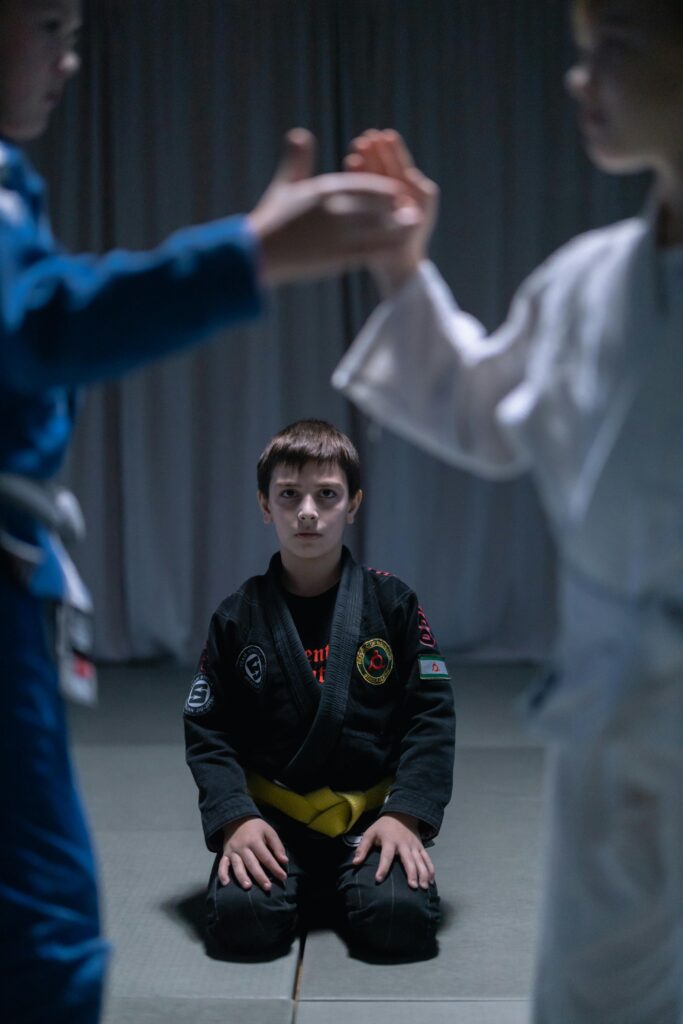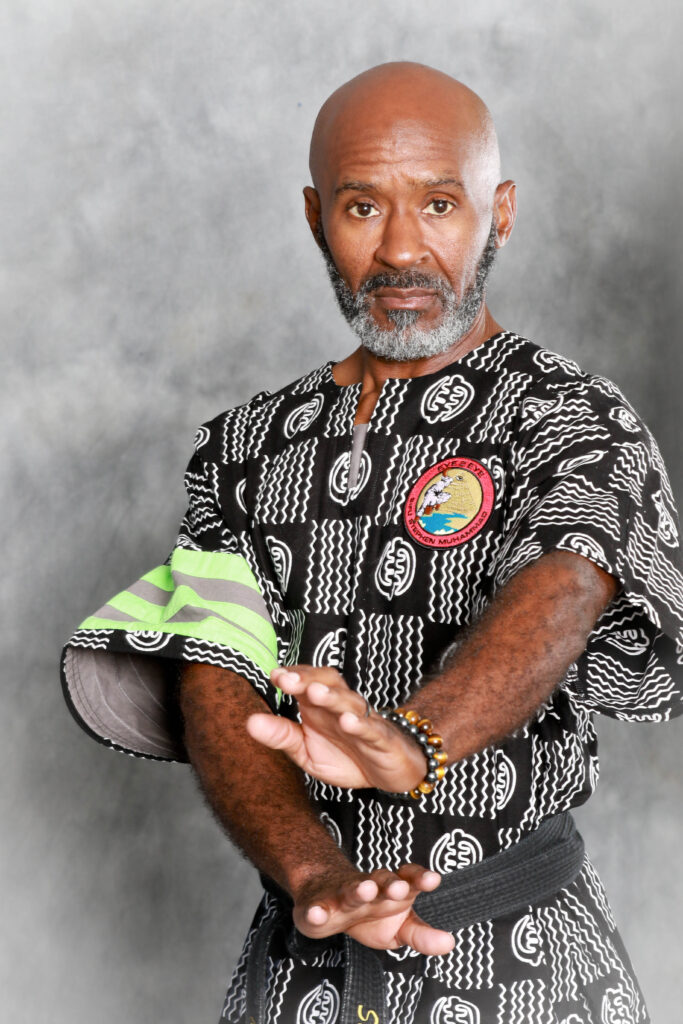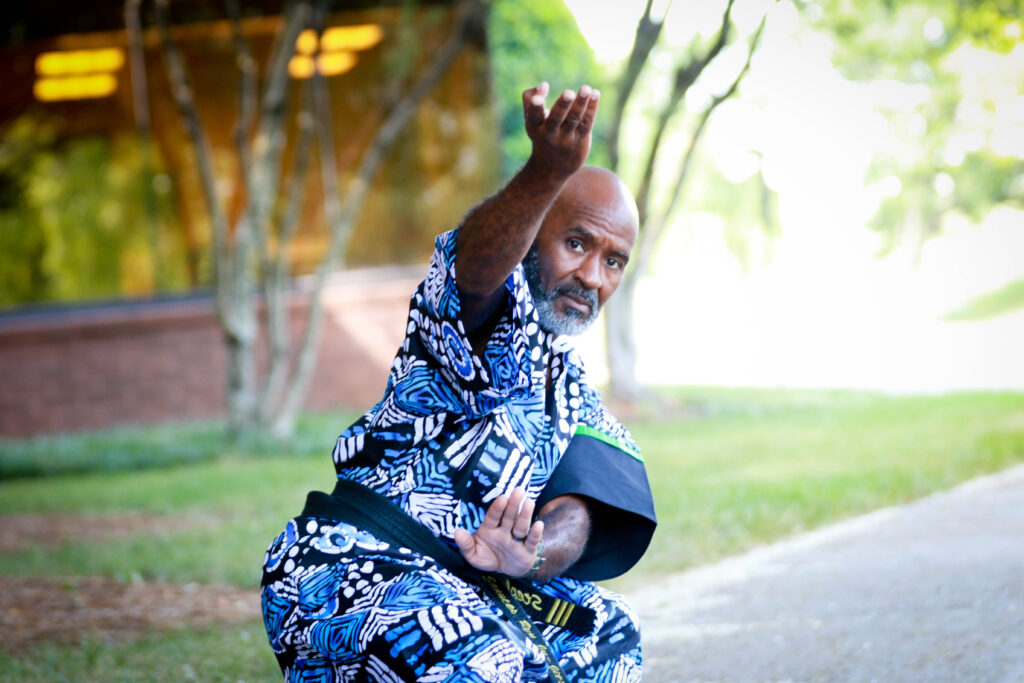Martial arts training has a way of teaching you more than just punches and kicks—it challenges you to grow as a person.
Through structured discipline, respect for others, and confidence-building, martial arts empowers you to think clearly and lead with purpose, even under pressure.
At Eye2Eye Combat, this philosophy extends beyond the dojo. With programs like our parenting workshops, a partnership with Brightstars CDC, we’re helping families build confidence and resilience together.
These workshops provide tools for creating a secure, respectful home environment—something we’ll explore later in the article. Let’s dive into how martial arts teaches respect and leadership skills that last a lifetime.
The Foundations of Respect in Martial Arts
Respect forms the foundation of everything we do in martial arts. The moment you step onto the mat, you step into a culture that values discipline, humility, and mindfulness.
Martial arts doesn’t just demand respect—it shows you how to live it. This isn’t about rigid rules; it’s about creating an environment where growth happens because everyone values the process.
Discipline as a Gateway to Respect
Discipline is non-negotiable in martial arts, and it starts with the little things. Showing up on time, keeping your uniform neat, and putting in consistent effort may seem simple, but these actions shape who you are.
When you respect the process—whether it’s perfecting your technique or holding a stance longer than you thought possible—you learn to value the effort it takes to grow. That respect naturally extends to those walking the same path with you.
Understanding Authority and Hierarchy
Hierarchy in martial arts isn’t about power—it’s about acknowledgment. When you bow to your instructor or use titles like “Sifu” or “Sensei,” you’re not just following tradition.
You’re honoring the knowledge and experience they’ve worked so hard to earn. It’s a simple gesture, but it reinforces a valuable lesson: respecting those who guide us is essential for any meaningful growth.
Empathy Through Partner Work
Sparring or practicing with a partner isn’t just about technique; it’s about connection. You can’t succeed without mutual trust and care.
A sloppy move could harm your partner, but when you both respect each other’s safety and learning process, you build a bond.
This mindfulness teaches empathy—not as a concept, but as a practice. You carry that understanding into every interaction, both inside and outside the dojo.
Leadership Skills Developed Through Martial Arts
Leadership isn’t about being in charge. It’s about setting an example, thinking ahead, and lifting others up. Martial arts naturally fosters these qualities, pushing you to grow into a role you may not even realize you’re capable of.
Confidence Through Mastery
Every time you nail a technique—whether it’s executing a clean throw or landing your first combination—you feel it. That surge of confidence comes from knowing you’ve put in the work.
This kind of self-assurance isn’t boastful; it’s grounded in experience. When you believe in yourself, you inspire confidence in others. That’s the root of effective leadership: showing people what’s possible when they commit.
Strategic Thinking and Problem Solving
Sparring isn’t about throwing punches aimlessly. It’s a chess match where you’re reading your opponent’s movements, staying calm under pressure, and planning your next move.
These lessons aren’t limited to the mat. Whether you’re handling a tight deadline or navigating a personal challenge, martial arts teaches you to pause, think critically, and act with intention.
Leading by Example
Leadership in martial arts doesn’t come with a title—it comes with responsibility. Senior students often guide beginners, showing them the ropes and supporting their growth.
It’s not about being the best; it’s about being willing to share what you’ve learned. By leading through action, you inspire others to step into their own potential. That’s the kind of leadership that sticks.
How Martial Arts Encourages Personal Growth
Growth in martial arts is personal. It challenges you to face yourself—your fears, your frustrations, and your limits—and come out stronger. It’s not about being perfect; it’s about showing up, putting in the effort, and letting the process transform you.
Self-Reflection and Accountability
Martial arts demands honesty with yourself. Every class is an opportunity to ask, “What can I do better?” Sometimes, that means owning a mistake. Other times, it’s about recognizing how far you’ve come.
This practice of reflection builds accountability—not because someone’s watching, but because you care about your growth. You take that mindset into every area of life, whether it’s work, relationships, or personal goals.
Resilience Through Failure
Nobody gets it right the first time—or even the tenth. Martial arts is full of moments where you fall, miss the mark, or just plain struggle. But each failure teaches you something.
You learn to pick yourself up, try again, and push a little harder. That resilience becomes a habit, and before you know it, challenges that once seemed impossible feel manageable.
Falling doesn’t scare you anymore because you’ve learned how to get back up.
Energy Management and Emotional Regulation
Training pushes you physically, but it also trains your mind. You learn to control your breathing, pace your energy, and stay composed even when the pressure’s on.
These lessons extend beyond sparring. Whether it’s a stressful day at work or a tough conversation, martial arts gives you tools to keep your emotions in check. You don’t react—you respond, and that makes all the difference.
The Role of Parenting Workshops in Teaching Respect and Leadership
At Eye2Eye Combat, respect and leadership are at the heart of everything we do. We believe these skills don’t just show up one day—they’re cultivated, starting at home.
That’s why we’ve teamed up with Bright Stars CDC to offer workshops designed to give parents the tools they need to foster these values in their families.
These workshops combine the science of child development with the practical, hands-on training of self-defense. Because raising confident, respectful leaders doesn’t happen by accident—it takes intention, practice, and support.
Collaborative Efforts Between Bright Stars CDC and Eye2Eye Combat
These workshops are a partnership in the truest sense of the word.
Bright Stars CDC brings their expertise in understanding children’s emotional and developmental needs, while Eye2Eye Combat focuses on teaching parents the physical and mental skills to protect their families.
Together, we’re creating a space where parents learn how to handle real-life challenges, from setting boundaries to staying calm under pressure.
You don’t just leave with tips; you leave with skills that can change how your family interacts and grows. It’s not about perfection—it’s about progress, one step at a time.
Teaching Respect at Home
Kids don’t learn respect because you tell them to—they learn it because they see it in action. These workshops help parents become role models of respect through everyday interactions.
Simple changes, like speaking calmly during disagreements or choosing positive affirmations, can shift the tone in your home.
Think about it: when you say, “I trust you” or “You’re capable,” you’re not just building respect; you’re also planting seeds of confidence in your child.
It’s about creating an environment where respect flows in every direction—parent to child, child to parent, and even between siblings.
Leadership for Families
Leadership doesn’t start with a title; it starts with actions. At home, that means setting boundaries and leading by example.
We guide parents on how to create clear expectations while staying consistent, which gives kids a sense of security and responsibility. And when we add self-defense training into the mix, the family dynamic shifts.
Practicing together builds trust and teamwork. When your family knows they can rely on each other, everyone steps into their role with more confidence.
Leadership at home isn’t just about rules—it’s about creating a culture of respect, accountability, and support.
Why These Skills Matter
The lessons of respect and leadership extend far beyond your home or the dojo. They’re life skills that prepare you—and your family—to handle challenges, work with others, and thrive in any environment.
Building Stronger Communities
Communities thrive when people respect one another and work together, and martial arts naturally encourages these values. Training alongside others teaches you to see the value in different perspectives.
Respect isn’t just about politeness—it’s about recognizing what others bring to the table. When these principles spill over into your family, workplace, or neighborhood, they create environments where everyone feels supported.
Leadership plays a role here too. It’s not just about stepping up for yourself but helping others do the same, which strengthens bonds and makes communities more resilient.
Equipping the Next Generation
Respect and leadership aren’t just for adults—kids benefit immensely when they learn these skills early.
Imagine a child who knows how to stand up for themselves, face challenges head-on, and take responsibility for their actions. That’s the kind of confidence and capability martial arts training instills.
These lessons are especially important in today’s world, where peer pressure and social challenges can be overwhelming.
When children learn how to navigate tough situations with respect and strength, they’re better prepared for success in school, friendships, and beyond.
The Long-Term Impact on Personal and Professional Life
Martial arts training doesn’t just make you physically stronger—it changes how you approach life.
Employers value people who lead by example, solve problems under pressure, and communicate effectively. These are all skills you develop in training.
When you’ve spent time mastering techniques and overcoming obstacles on the mat, you carry that same focus and resilience into your career.
Empower Your Family with Confidence and Safety
Respect and leadership are life skills that martial arts instills naturally, shaping individuals into confident, capable leaders who value themselves and others. These principles aren’t just for the dojo—they’re for life.
At Eye2Eye Combat, we’re passionate about helping families embrace these values, which is why we’ve partnered with Bright Stars CDC for our unique Parenting Workshops.
Through these sessions, you’ll gain practical tools to build a respectful, resilient, and confident family dynamic. Ready to take the first step? Join us today and give your family the skills to thrive together.
FAQs
How do martial arts teach respect?
Martial arts teach respect through structured discipline, like bowing to instructors and partners, following traditions, and valuing the learning process. You quickly understand the importance of treating others with kindness and appreciation, both in and out of the dojo. Respect becomes second nature because it’s embedded in every interaction and lesson.
Is martial arts training suitable for beginners?
Absolutely! Martial arts is for everyone, no matter your age, fitness level, or experience. We start you with foundational skills, teaching at a pace that works for you. The goal is to build confidence and strength step by step, so you’ll feel comfortable while learning something new and exciting.
Can martial arts help build leadership skills?
Yes, martial arts naturally develops leadership. As you gain confidence and master techniques, you learn to mentor others and take on challenges with resilience. Leadership in martial arts is about inspiring others by example—whether it’s guiding a classmate or taking responsibility in your daily life.
How do parenting workshops complement martial arts?
Our parenting workshops teach respect, communication, and teamwork—the same core values we emphasize in martial arts. By combining child development strategies with self-defense, parents and kids learn to work together while building confidence and safety skills. It’s a perfect way to strengthen family bonds and instill leadership at home.
What age groups can benefit from martial arts training?
Martial arts benefits all ages! Kids as young as four develop focus and coordination, teens learn confidence and self-defense, and adults build fitness and stress management skills. We even offer gentle, mobility-focused training for seniors. No matter your age, martial arts helps you grow physically and mentally.





